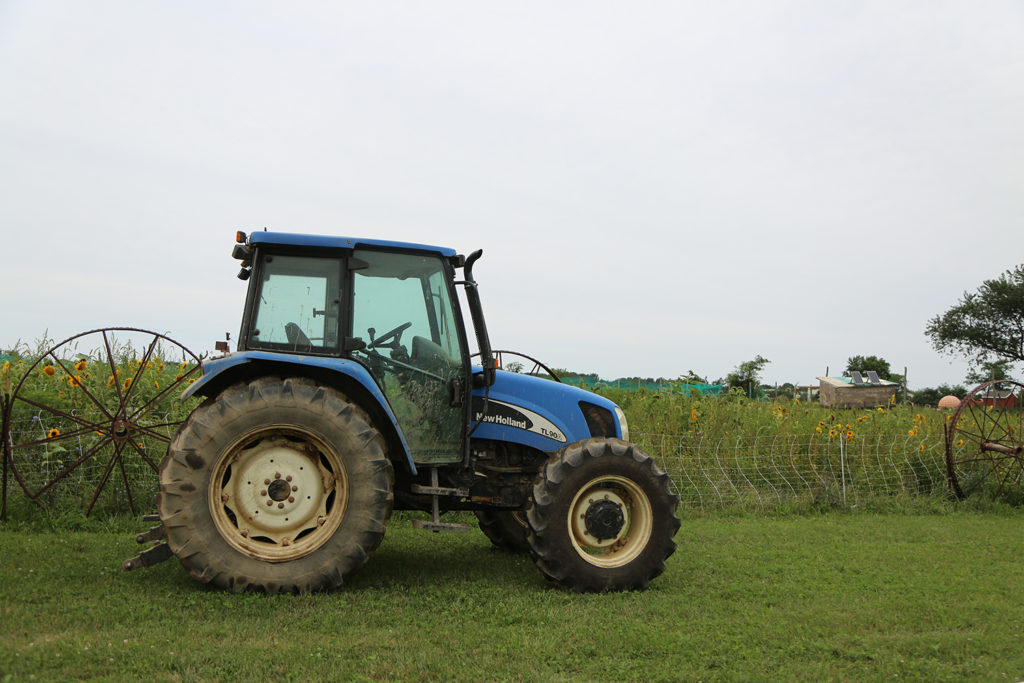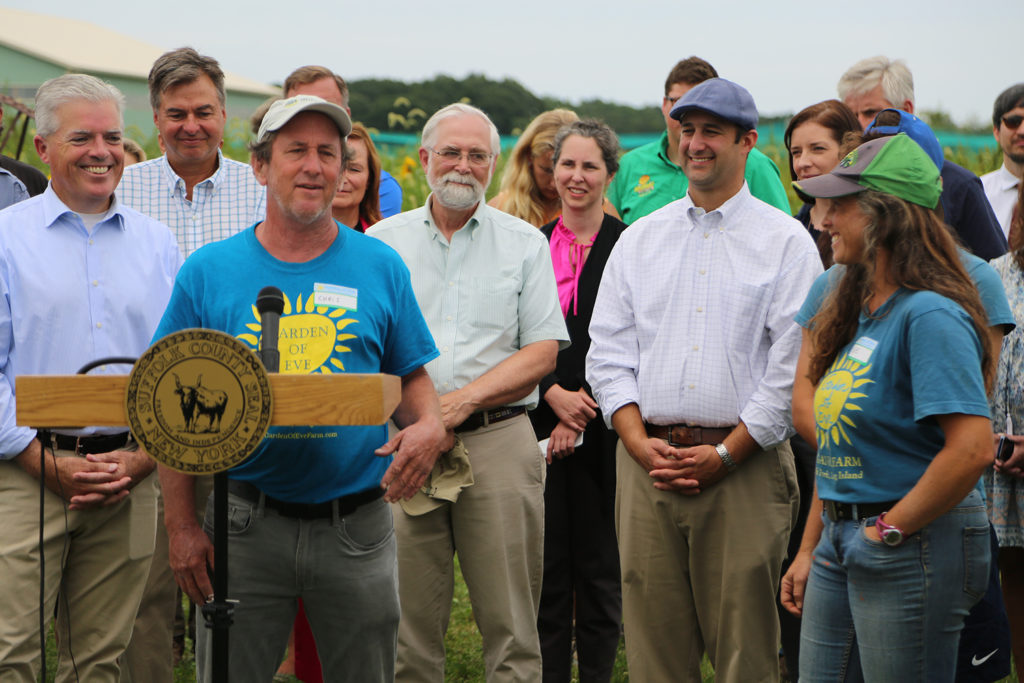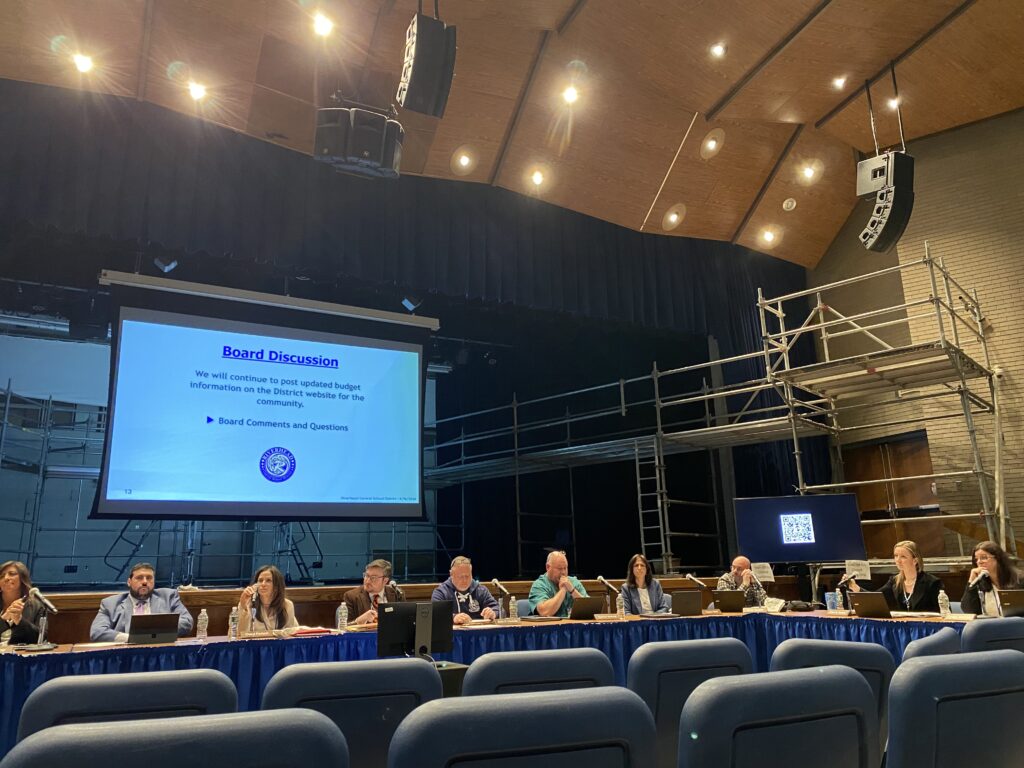County announces $100M initiative for farmland preservation

As they celebrate their 20th year farming organic vegetables, fruit and flowers along Sound Avenue in Riverhead, Chris and Eve Kaplan-Walbrecht can’t help but think about the future like so many other farmers. The couple put “their heart and soul” into Garden of Eve Organic Farm and Market on property that was already saved once from development a generation ago.
“My dad bought it from a developer in 1977,” Ms. Kaplan-Walbrecht said. “And here we are all these years later and it’s still a farm.”
The couple said it’s important to them that the property remains a farm even after they can no longer run the day-to-day operations at Garden of Eve. To help make that reality, the couple hopes to take advantage of a new farmland preservation program called the 100 for 10 Farmland Preservation Initiative.
Suffolk County Executive Steve Bellone joined the couple Tuesday afternoon in announcing the new initiative at the Riverhead farm. The county plans to invest $100 million over the next 10 years to preserve remaining at-risk farms all across the county, the majority of which are on the East End where farming remains most prominent. A large group of fellow politicians, farmers and land preservation experts from throughout the county joined them for the announcement.
“The preservation of farming in Suffolk County is absolutely critical to our region’s future,” Mr. Bellone said. “And that means it is incumbent on us to do everything that we can to preserve the farmland that we have against the ever increasing development pressure.”
The initiative is part of a push to preserve 10,000 acres of farmland in the county by picking up an effort that dates back to 1970 when a Nassau-Suffolk Comprehensive Plan Summary first recommended the preservation of 30,000 acres of farmland. Mr. Bellone held up a copy of a vintage Newsday front page that featured the comprehensive plan story on the cover.
Suffolk County’s Farmland Development Rights program, the first of its kind in the nation, Mr. Bellone said, began a few years later in 1974.

The county has since persevered more than 11,000 acres of farmland, while local municipalities and land trusts have preserved an additional 9,000 acres.
“We have gotten 2/3 of the way there,” in the last 50 years, Mr. Bellone said. “The last 10,000 acres may be the most difficult, but we must meet this challenge. It is essential that we complete this mission first articulated more than 50 years ago.”
Mr. Bellone said the county, with support of the Legislature, will “put exclusive funding for farmland preservation into the capital plan to help make these purchases.”
There would be an initial commitment of $25 million over the next three years, the county executive said. The effort will require cooperation from local municipalities, the state, and organizations like Peconic Land Trust. Mr. Bellone said a meeting will be held soon with various stakeholders to discuss how to complete the preservation goal.
Participating in the initiative is voluntary. Information for interested farmers is already available on the county website.
County Legislator Al Krupski (D-Cutchogue) spoke about food security and the important role local farms play here amid a changing climate.
“You think about food security just for Long Island and the millions of people who live here, to save this land for food production is really critical,” he said.

Rob Carpenter of the Long Island Farm Bureau said the pandemic highlighted the need for infrastructure to support local food supplies.
“The first step of that is working to preserve the farmland to ensure that asset will be here for generations,” he said.
Speaking the economics of the program, Mr. Krupski said farmland preservation longterm doesn’t cost the taxpayers after the initial purchase.
“When you preserve farmland, you have land still in private ownership,” he said. “You have the visual benefits, the community, open space with food production, but it still stays on the tax roll.”
Ms. Kaplan-Walbrecht said they began exploring preservation options at Garden of Eve, where they farm between 50-55 acres, shortly before the pandemic hit.
Farming, she said, is a difficult profession that has only gotten harder as the years pass.
“This announcement definitely gives us hope that this farm will be preserved forever as well,” she said.








